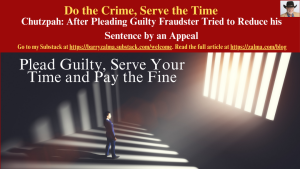Do the Crime, Serve the Time

See the full video at https://rumble.com/v4bkm60-do-the-crime-serve-the-time.html and at https://youtu.be/hrfjwKNeGrI
Post 4730
After pleading guilty, Armando Valdes appealed his 60-month sentence for health care fraud, in violation of 18 U.S.C. § 1347. Valdes’s conviction and sentence arose out of his scheme to submit millions of dollars in fraudulent medical claims to United Healthcare and Blue Cross Blue Shield for intravenous infusions of Infliximab, an expensive immunosuppressive drug. These infusions, purportedly given to patients at Valdes’s medical clinic, Gasiel Medical Services (“Gasiel”), were either not provided or were medically unnecessary.
In United States Of America v. Armando Valdes, No. 22-12837, United States Court of Appeals, Eleventh Circuit (December 19, 2023) was not convinced of his many arguments against the sentence imposed by the District Court.
LOSS AMOUNT
Under sentencing guidelines, U.S.S.G. § 2B1.1(b)(1), a defendant’s offense level increases with the amount of “loss” caused by the offense. In Valdes’s case, his base offense level was increased by 22 levels because the district court found that the loss amount was $38 million.
Section 2B1.1(b)(1)(L) provides that a defendant’s base offense level is increased by 22 levels if the loss from the fraud offense was more than $25 million but less than $65 million. Guidelines do not require a precise determination of loss. Instead, the district court need make only a reasonable estimate based on the available information.
While the government has the burden to prove the loss amount with specific, reliable evidence, the district court may make its factual findings as to the loss amount based on, among other things, evidence presented at trial or sentencing or on the undisputed statements in the presentence investigation report (“PSI”).
ANALYSIS
Valdes was unable to show the district court’s determination that the loss amount of $38 million was clear error. In his factual proffer and at his plea hearing, Valdes admitted that through his medical clinic, Gasiel, he submitted approximately $33 million in fraudulent claims to United Healthcare and approximately $5 million in fraudulent claims to Blue Cross Blue Shield. Because there is a strong presumption that those statements are true the district court could rely on them in determining the loss amount.
Valdes’s arguments failed because: First, for purposes of the loss amount under the intended loss includes unlikely amounts of pecuniary harm, such as claims that exceed the insured value; Second, at the sentencing hearing, Valdes’s own fraud analyst testified that, even accounting for duplicate claims, the total loss amount was above $25 million.
The Eleventh Circuit concluded that Valdes did not show clear error in the district court’s determination.
SOPHISTICATED MEANS ENHANCEMENT
Valdes also challenged the district court’s application of a sophisticated means enhancement. Valdes argues that his offense involved the largely repetitive act of billing for a service that was not provided and was easily detectable.
If a defendant’s fraud offense involved sophisticated means, his offense level is increased by two levels. Whether conduct is sophisticated is based on the conduct as a whole, not on the individual steps. Repetitive and coordinated conduct can be a sophisticated scheme even when no one step is particularly complicated. Addressing a sophisticated means enhancement, the Eleventh Circuit reviews a district court’s factual findings for clear error.
The Eleventh Circuit found no error in the district court’s application of the two-level sophisticated means enhancement. Based on his factual proffer and undisputed facts in the PSI, Valdes operated an elaborate, years-long scheme to defraud insurance companies for expensive Infliximab infusions, obtaining over $7 million as a result. The large amount of money defrauded and the six-year period the scheme went undetected support a finding of sophisticated means. The fact that Gasiel was a real medical clinic that provided other, legitimate medical services to real patients, including primary care services and other intravenous infusions, made the fraud scheme involving Infliximab infusions more difficult to detect and was, thus, sophisticated.
ABUSE-OF-TRUST ENHANCEMENT
If a defendant abused a position of public or private trust, or used a special skill, in a manner that significantly facilitated the commission or concealment of the fraud offense, the sentencing court increases his offense level by two levels. Being a doctor is a type of special skill.
The undisputed facts show Valdes used his skills as a trained doctor, whether licensed or not, to facilitate his fraud by submitting false medical claims. Given that Valdes used a special skill in the commission of his offense, the district court properly applied § 3B1.3’s two-level enhancement.
FORFEITURE OF VALDES’ RESIDENCE
Valdes argues the district court erred by ordering the forfeiture of his home as substitute property. Valdes admits that as part of his plea agreement, he agreed to forfeit his primary residence as substitute property.
The record showed that the forfeiture allegations in Valdes’s indictment and the plea agreement he signed both expressly identified Valdes’s primary residence by address as being substitute property potentially subject to forfeiture. The district court explained, among other things, that Valdes “not only agree[d] to give up property that was directly derived from this crime,” but also “to give up what is known as substitute assets.” Valdes responded that he understood the forfeiture provision.
The record as a whole reflects that Valdes understood that his primary residence was the substitute property that could be subject to forfeiture. Because Valdes showed no plain error in the district court’s accepting his guilty plea as to the forfeiture allegations, he failed to show the district court erred in ordering the forfeiture of his primary residence as substitute property.
Insurance fraud perpetrators have unmitigated gall and refuse to admit that they were actually caught committing the crime of insurance fraud and must serve the time and pay the restitution or fines required. Valdes tried, after entering into a plea agreement to avoid trial and a more lengthy sentence, included the forfeiture of his home, only to file a spurious appeal to save it. The Eleventh Circuit saw through his scheme and made him serve the time in prison for 60 months and pay for the crime with the assets he gained as a result of his years of fraud.
 (c) 2024 Barry Zalma & ClaimSchool, Inc.
(c) 2024 Barry Zalma & ClaimSchool, Inc.
Please tell your friends and colleagues about this blog and the videos and let them subscribe to the blog and the videos.
Subscribe to my substack at https://barryzalma.substack.com/publish/post/107007808
Go to Newsbreak.com https://www.newsbreak.com/@c/1653419?s=01
Go to X @bzalma; Go to the podcast Zalma On Insurance at https://podcasters.spotify.com/pod/show/barry-zalma/support; Go to Barry Zalma videos at Rumble.com at https://rumble.com/c/c-262921; Go to Barry Zalma on YouTube- https://www.youtube.com/channel/UCysiZklEtxZsSF9DfC0Expg; Go to the Insurance Claims Library – http://zalma.com/blog/insurance-claims-library.
Like this:
Loading…







